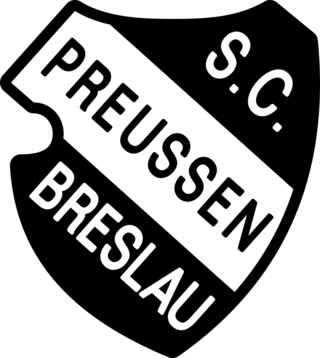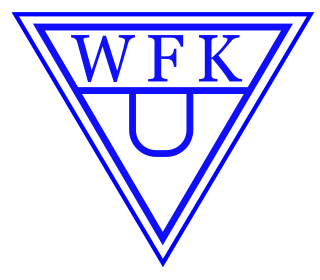
VfR Bürstadt is a German association football club playing out of Bürstadt, Hesse. The team was founded 1 February 1910 as SC 1910 Bürstadt and took on the name VfR on 23 August 1919. Between 1973 and 1983 they played as VfR Oli Bürstadt in recognition of sponsoring firm Otto Limburg Bürstadt-Bobstadt.

1. FC Kattowitz was an ethnically German football club playing in what was Kattowitz, Silesia Province in Germany and was active during the inter-war period and World War II when the two countries struggled over control of the region. Established in 1905, the original club disappeared in 1945; a modern-day Polish club using the name 1. FC Katowice was formed in 2007.
1. Bockenheimer FC was a German association football club from the western city district of Bockenheim.

SC Germania Breslau was a German association football club from the city of Breslau, Lower Silesia. The team spent several seasons in upper tier regional play in the Südostdeutscher Fußball-Verband and advanced to the league playoffs in 1911 and 1912.

SC Preußen Breslau was a German association football club from the city of Breslau, Lower Silesia. The club was briefly part of the top flight regional Südostdeutscher Fußball-Verband in the early 1900s.

SG Gesundbrunnen Berlin was a short-lived postwar German association football club from the city of Berlin. Following World War II, occupying Allied authorities banned most organizations throughout the country, including sports and football clubs, as having been politically compromised under the Nazi regime. Many of these clubs soon re-emerged in the later half of 1945, with most being forced to abandon their previous identities and instead playing as local community-based clubs. Sportgruppe Gesundbrunnen Berlin became the temporary home of the memberships of Hertha BSC Berlin and SV Norden-Nordwest Berlin playing in Hertha's ground at Plumpe in the city's Gesundbrunnen neighbourhood.

Helvetia Berlin was a German association football club from the city of Berlin.

Lufthansa SG Berlin was a German association football club based in the Schöneberg district of Berlin. It was established in 1931 as the worker's side of the national airline Deutschen Lufthansa Berlin and was active through to the end of World War II.

Nordiska Berlin was a German association football club from the city of Berlin.

SC Adler Pankow was a German association football club from the district of Pankow in the city of Berlin. It was formed out of the 1910 union of Pankow 08 and Adler Pankow. Both of these sides, as well as their successor, played in the Verband Brandenburgischer Ballspielvereine one of several top flight leagues in Berlin and the surrounding state of Brandenburg.
SSV Stötteritz is a German association football club from the city district of Stötteritz in southeast Leipzig, Saxony. It is the successor side to VfL Leipzig-Südost, which captured three national titles in the Arbeiter-Turn- und Sportbund in the early 1920s. The ATSB was a leftist national sports organization which organized a football competition and championship separate from that of the DFB.
Tuspo Fürth was a German association football club from the city of Fürth, Bavaria that was notable as the first champion of the Arbeiter-Turn- und Sportbund which staged its own national football championship, separate from that of the DFB, from 1920–32. The club became part of the tradition of SpVgg Greuther Fürth through a merger on 1 July 2003.
Stern Breslau was a German association football club from the city of Breslau, Lower Silesia. It was established in 1920 as the workers' club BSG Großmarkhalle Breslau and by 1921 was playing as Sportverein Stern Breslau. It was part of the Arbeiter-Turn- und Sportbund,, a leftist national sports organization which organized a football competition and championship separate from that of the DFB. Stern is notable as the losing side in the 1924 league final where they were beaten by Dresdner SV 10 6:1. This was the first of four consecutive titles for the Dresden club.

SV Stralau was a German association football club from the district of Stralau in the city of Berlin.
SC Jülich is a German association football club from the city of Jülich, North Rhine-Westphalia. The club distinguished itself by winning three consecutive German amateur football championships from 1969 to 1971 while part of the third division Amateurliga Mittelrhein.

Charlottenburger Sport Verein Olympia 1897 is a German association football club from the district of Charlottenburg in the city of Berlin, formed following a 1992 merger with BFC Olympia 1953 Berlin. One of the city's earliest football clubs, SC des Westens 97 Berlin, is now part of CSV Olympia.
BFuCC Deutschland Berlin was an early German association football club from the city of Berlin. The club is notable as one of the founding clubs of the German Football Association at Leipzig in 1900. The club's full name was Berliner Fußball -und Cricket Club Deutschland and, like many other clubs of the era built around enthusiasm for the new English sports of football, rugby, and cricket, Deutschland also fielded a cricket side.
The Verbandsliga Norddeutschland was one of several association football first tier leagues in the German Empire. The league only existed for one season and covered the area administered by the Northern German Football Association.

SpVgg Leipzig is a German association football club from the city of Leipzig, Saxony. It was formed on 15 February 1899 as the football department of gymnastics club ATV Leipzig-Lindenau and became independent as Spielvereinigung Leipzig in 1903. Alongside VfB Leipzig and Dresdner SC, SpVgg was one of the most successful pre-war sides in Saxony.

Warnsdorfer Fußball Klub, commonly known as Warnsdorfer FK, was an association football club from the city of Varnsdorf, in what is today the Czech Republic.








